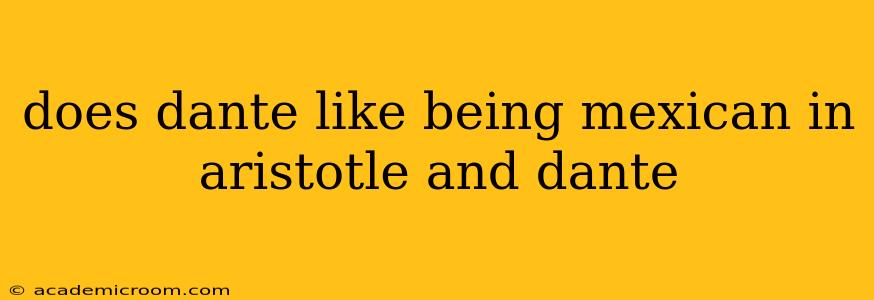Does Dante Like Being Mexican in Aristotle and Dante Discover the Secrets of the Universe?
Benjamin Alire Sáenz's Aristotle and Dante Discover the Secrets of the Universe is a coming-of-age story exploring themes of identity, friendship, and self-discovery. While the novel doesn't explicitly state Dante's feelings about being Mexican in a single sentence, his experiences and interactions throughout the story paint a complex picture. It's less about a simple "like" or "dislike" and more about a nuanced exploration of his cultural identity and its impact on his life.
What is Dante's Relationship with His Mexican Heritage?
Dante's Mexican heritage is deeply woven into his character. His family's traditions, the language spoken at home, and his interactions with his parents and extended family all contribute to his sense of self. However, his relationship with this heritage is not without its complexities. The novel subtly reveals the pressures and challenges he faces as a young Mexican-American navigating a world that isn't always welcoming or understanding of his culture.
Does Dante Feel Pressure to Conform to Certain Expectations?
Yes, Dante experiences pressure to conform. The novel hints at societal expectations that might push him to suppress aspects of his Mexican identity to fit in with the dominant culture. He grapples with the tension between his own personal experiences and the expectations of others, a struggle many young people from minority backgrounds face.
How Does Dante's Family Influence His Identity?
Dante's family plays a crucial role in shaping his identity. Their love and support are evident, but the story also acknowledges the unspoken pressures that come with family expectations and cultural traditions. His relationship with his father, in particular, is a significant factor in his journey of self-discovery. The unspoken feelings and communication gaps represent the complexities many experience in navigating intergenerational differences within immigrant families.
Does Dante Embrace His Mexican Heritage?
Ultimately, Dante's journey suggests a growing embrace of his Mexican heritage. Through his experiences, challenges, and reflections, he gradually comes to a deeper understanding and appreciation of his cultural background. It's not a sudden shift, but rather a gradual evolution throughout the novel's narrative. He doesn't explicitly say "I love being Mexican," but his actions and reflections reveal a growing sense of pride and belonging.
Does Dante’s Identity Affect His Relationship with Aristotle?
While Dante's Mexican heritage isn't the central focus of his relationship with Aristotle, it forms an essential part of who he is. The acceptance and understanding Aristotle offers help Dante navigate his feelings about his identity. Their friendship provides a safe space for him to explore and reconcile different aspects of himself.
What are some Examples of Dante's Mexican Identity in the Book?
Specific examples showcasing Dante's Mexican identity are subtly woven throughout. These range from casual conversations and family traditions to internal reflections that illustrate the unique experiences shaping his identity. The novel does not explicitly highlight these instances but instead uses these details to paint a realistic portrait of a young Mexican-American.
In conclusion, Dante's experience of being Mexican in Aristotle and Dante is a nuanced and multifaceted exploration. It's not a simple matter of liking or disliking but rather a complex process of self-discovery, reconciliation, and embracing his heritage within the larger context of his life and relationships. The novel offers a sensitive portrayal of this journey, resonating with readers who have similar experiences navigating their own cultural identities.
